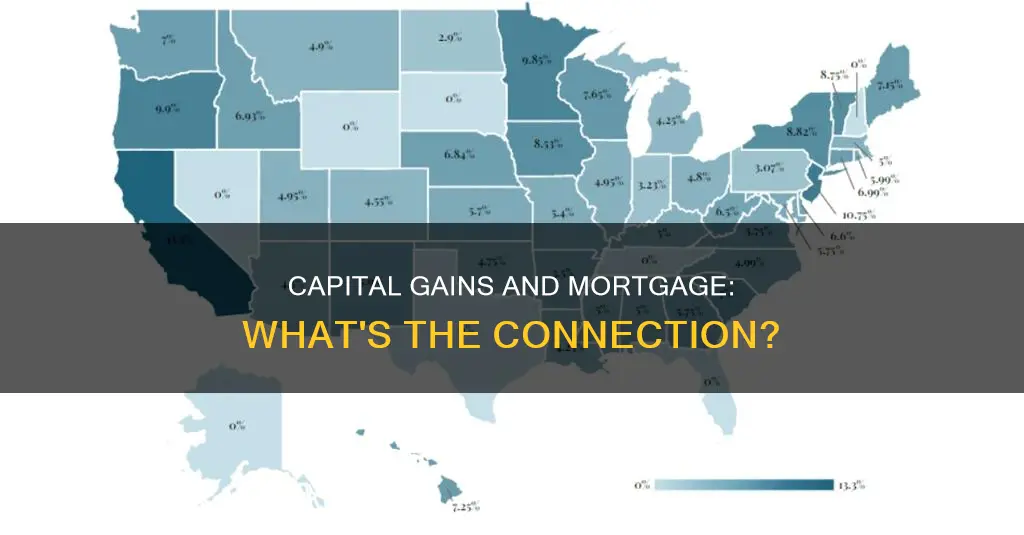
When selling a home, homeowners may need to pay capital gains tax on any profit made from the sale. This is calculated by subtracting the purchase price and any associated costs (such as renovations) from the selling price. The mortgage itself does not directly impact the capital gains, but the proceeds from the sale are typically used to pay off the remaining mortgage. It is important to note that capital gains tax is based on the holding period, with different rules and rates for short-term (less than a year) and long-term gains (more than a year). Additionally, capital gains can be considered as income for mortgage applications, but this depends on the lender's criteria and verification requirements.
| Characteristics | Values |
|---|---|
| When mortgage impacts capital gains | When the homeowner sells the home and uses the money received to pay off the mortgage |
| Capital gains calculation | (Selling Price - Purchase Price) - Exemption Amount |
| Factors determining capital gains | Income, tax filing status, time for which the property was owned, whether the house is the primary residence |
| Cost basis | Purchase Price (including any closing costs) + Capital Improvements |
| Capital gains tax | Paid on an asset's appreciation during the time it was owned |
| Capital loss | When the asset is sold for less than the adjusted basis |
| Capital gains as income for mortgage | Capital gains can be used as income for a mortgage |
What You'll Learn

Capital gains as income for a mortgage
When it comes to mortgages and capital gains, there are a few things to consider. Firstly, capital gains income can be used as proof of income to qualify for a mortgage, but it is rarely done because capital gains are typically derived from one-time asset sales. To use capital gains as income for a mortgage, lenders usually require proof of stable and ongoing income. This can be demonstrated by providing documentation of a consecutive two- to three-year history of capital gains income. Lenders may also request signed federal income tax returns for the past two years, specifically IRS Form 1040, Schedule D, although capital losses on Schedule D can be excluded.
Additionally, lenders may ask for two months of the most recent bank statements to document the expected continuation of capital gains income. A letter from the borrower's accountant stating a history of capital gains income and its expected continuation may also be requested. In some cases, only one year's worth of investment income documentation is required, and loan officers can clarify the specific requirements based on the loan type. It is important to note that the income will be averaged, and this averaged amount will be used as the borrower's income.
Moreover, when calculating capital gains with a mortgage, homeowners can deduct their mortgage interest annually. However, when selling a home for a profit, the mortgage does not impact the capital gains. The sale proceeds are typically used to pay off the mortgage. The amount realized from the sale of the home, including any cash or property received and the buyer's assumed indebtedness, less selling expenses, determines whether there is a capital gain. This amount realized is compared to the adjusted basis of the home, which includes the cost of acquiring the home, capital improvements, and any applicable deductions.
It is worth noting that capital gains tax is applicable when selling a home or other real estate assets. This tax is calculated based on the asset's appreciation during the ownership period. The taxable capital gain is typically calculated as the selling price minus the purchase price and any exemptions. Rental properties and second homes are also subject to capital gains tax, although there may be ways to avoid paying this tax, especially if the property's value has increased in recent years.
Mortgage CRM and LOS Integration: A Powerful Combination
You may want to see also

Calculating capital gains tax
Firstly, it's important to understand what constitutes a capital gain or loss. Simply put, a capital gain or loss is the difference between what you paid for a capital asset (like bonds, mutual funds, ETFs, real property, or stocks) and what you sold it for. This is often referred to as the "basis" of the asset. For example, if you bought a home for $150,000 and later sold it for $200,000, your capital gain would be $50,000. It's important to note that any commissions or fees associated with the sale should also be taken into account when calculating the basis.
In the context of selling a home, the basis is typically the purchase price plus any closing costs, non-decorative investments made in the property (such as a new roof), and sales expenses like real estate agent fees. For instance, if you spent $50,000 on a kitchen renovation that increased the overall value of your home, your basis would increase to $200,000. If you then sell the home for $200,000, your profit would be $0, resulting in no capital gains tax.
When calculating capital gains tax, it's also important to consider the holding period of the asset. Capital gains can be classified as either short-term or long-term, depending on how long you owned the asset before selling it. Short-term capital gains apply to assets held for one year or less, while long-term capital gains refer to assets held for more than one year. The tax rates for these two categories differ, with long-term capital gains generally being taxed at lower rates.
It's worth noting that certain exemptions and deductions may apply when calculating capital gains tax. For example, when selling your primary residence, a certain amount of capital gains (up to $250,000 for a single filer or $500,000 for a married couple) may be exempted from taxation. Additionally, if your capital losses exceed your capital gains, you may be able to claim a deduction to lower your taxable income.
The calculation of capital gains tax also varies depending on the location, as different states have different tax rates for capital gains. Some states with high income tax, such as California and New York, also tend to have high taxes on capital gains. Therefore, it's essential to consider both federal and state taxation when calculating capital gains tax.
Understanding Mortgage Escrow: Accounts, Payments, and Zero Balance
You may want to see also

Mortgage interest deduction
When selling a home, there are various components that may impact capital gains. One of the taxes you will encounter when selling your home is the capital gains tax. This is calculated on the basis of the asset's appreciation during the time that you owned it. For example, when you sell your home, you are typically taxed on the difference between the sale price and your original purchase price. This is known as the taxable capital gain.
The mortgage interest deduction is a tax break that allows you to reduce your taxable income by the amount of money you have paid in mortgage interest during the year. This deduction is only available to those who itemize their deductions on Schedule A and is not available to those who take the standard deduction. Homeowners can find a summary of their mortgage interest payments on Form 1098, which lenders should send out by the end of January.
The mortgage interest deduction is subject to certain limitations. As per the 2017 Tax Cuts and Jobs Act, the deduction is limited to the interest on the first $750,000 of a mortgage ($375,000 if married and filing separately). However, if the mortgage was obtained before December 16, 2017, the limit is higher at $1 million ($500,000 if married and filing separately). Additionally, the property must meet certain requirements to qualify for the deduction, such as having sleeping, cooking, and toilet facilities.
It is important to note that once the home is sold, the mortgage does not directly impact capital gains. The sale proceeds are typically used to pay off the remaining mortgage balance. However, the mortgage can affect the adjusted basis of the home, which is used to determine whether there is a capital gain or loss on the sale. The adjusted basis includes the cost of acquiring the home, the cost of any capital improvements, and certain other adjustments.
Mortgage Rates: Impacting Your Monthly Payment Costs
You may want to see also

Capital gains tax on real estate
When selling a home, one of the taxes you'll encounter is the capital gains tax. This is a tax on the appreciation of an asset during the time you owned it. In the case of a home sale, the capital gains tax is calculated on the difference between the sale price and the original purchase price. This is known as the adjusted basis of the home. The adjusted basis is generally the cost of acquiring the home plus the cost of any capital improvements, less casualty loss amounts and other decreases. For example, if you spent $50,000 on a kitchen renovation, this would be considered a capital improvement and would increase your adjusted basis.
The capital gains tax exclusion only applies to the sale of your primary home. It does not apply to commercial real estate, rental properties, or houses used as investment vehicles. If you own a rental property or a second home, you may be subject to capital gains tax. However, there are ways to avoid paying this tax, especially if the property has increased in value in recent years.
The capital gains tax rate depends on three factors: your taxable income, your filing status, and how long you owned the property before selling it. If you owned the home for a year or less before selling, short-term capital gains tax rates apply, which are equal to your ordinary income tax rate. If you owned the home for longer than a year before selling, long-term capital gains tax rates apply, which are typically more favourable. Many people qualify for a 0% tax rate, while others pay 15% or 20%, depending on their income and filing status. For taxable years beginning in 2024, the tax rate on most net capital gains is no higher than 15% for most individuals.
It's important to note that the mortgage doesn't impact the capital gains calculation. When a homeowner sells their home, they use the sale proceeds to pay off their mortgage. However, homeowners can deduct their mortgage interest annually. Additionally, if you receive an informational income-reporting document, such as Form 1099-S, you must report the sale of the home, even if the gain from the sale is excludable.
Gifts, Mortgages, and Parental Money: Impact and Insights
You may want to see also

Capital gains tax on primary residence
When selling a primary residence, capital gains tax is calculated on the difference between the sale price and the adjusted cost basis. The adjusted cost basis is the original purchase price plus the cost of any capital improvements, such as renovations that increase the property's value, minus any casualty losses or other decreases. For example, if you bought your home for $200,000 and spent $50,000 on a kitchen renovation that increased its value, your adjusted cost basis would be $250,000. If you then sold the home for $300,000, your capital gain would be $50,000.
The amount of capital gains tax owed depends on your income tax bracket, the length of time you owned the property, and whether it was your primary residence. If you owned the property for less than a year, the gain is considered short-term and is taxed as ordinary income. If you owned it for more than a year, it qualifies as a long-term capital gain, which typically has a lower tax rate.
In the United States, the IRS provides some relief on capital gains tax for those selling their primary residence. Single tax filers can exclude up to $250,000 of capital gains, while married couples filing jointly can exclude up to $500,000. Any gains exceeding these thresholds are subject to capital gains tax rates. It is important to note that the property must meet the criteria of a primary residence, which includes being the place where you spend most of your time and having its address listed on official documents.
It is worth noting that the mortgage itself does not impact the capital gains calculation. However, homeowners can deduct their mortgage interest annually when filing their taxes. Additionally, any repairs or renovations made to the property to improve the final selling price can also be deducted from the capital gains.
Understanding Mortgages in 1031 Exchanges: What You Need to Know
You may want to see also
Frequently asked questions
Capital gains tax is what you pay on an asset’s appreciation during the time that you owned it. For example, when you sell your home or another piece of property, you are typically taxed on the difference between the sale price and your original purchase price.
For a single filer or married couple, the equation to calculate capital gains tax is: Taxable Capital Gain = (Selling Price - Purchase Price) - Exemption Amount.
The mortgage doesn't impact capital gains once the home is sold. The homeowner will use the sale proceeds to pay off their mortgage. However, when applying for a mortgage, your income and expenses are big factors in determining if your application will be approved. Capital gains can be used as income for a mortgage.
If you sell your home after living in it for over a year, your long-term capital gains tax will be calculated based on your income tax bracket. You usually pay less in taxes on long-term capital gains compared to short-term capital gains.







